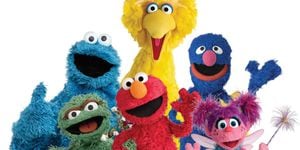American language invasion really sucks
We're being taken over. And while there are some who want to fight back, nobody really knows how.

What was once a gentle tide is now a tsunami carrying all before it.
It won't be long before we say toodle-oo to the English language, which is dying before our very ears.
The American conquest of English is the subject of a new book by journalist Matthew Engel, called That's The Way It Crumbles.
Engel, who lives in Herefordshire, says: "The American words the British invited into their homes are in danger of taking over. And it has become possible to imagine a time - 2120 would be a plausible and arithmetically neat guesstimate - when American English absorbs the British version completely.
"The child will have eaten its mother, but only because the mother insisted."
Since the early 19th century Britons have been enriching our vocabulary by willingly embracing the Americans' imaginative and innovative use of language, but the process has accelerated so rapidly that Engel is issuing a wake-up call - itself a classic Americanism.
"It has become entirely imaginable that our descendants will inherit a world that is essentially American. Some of the old languages and customs would undoubtedly persist, though in some cases perhaps just as curiosities. Worse fates may yet await this planet, but this one alone would offer a dull, grey future to humankind.
"It is not that no one cares; I have evidence that they do. But no one has worked out what to do about it.
"I think the idea of Britain being formally annexed by the US is a fantasy. The British would come over all patriotic and huffy, and unite against it. The process of subjugation is going well enough without anyone drawing attention to it.
"In foreign and defence policy the British long ago gave away almost all their independence of action. Now they are losing independence of expression," says Engel.
"The language certainly is crumbling. Public and private conversations are both full of words that were simply not used in Britain 40, 30, 20, 10, or even five years ago."
Now, for those who think they studiously avoid using Americanisms, think again.
Let's get that right from the get-go - a term I personally had never consciously heard before reading Engel's book, but have heard several times since.
It would be impossible, he says, to write a coherent book in English without words imported from the United States.
We are not talking about gee, shucks, and things like that, but words that are in everyday use. One of the earliest "battleground" words was belittle, as in to disparage, which had a long journey to acceptance in Britain, and one of the first words to cross the pond eastwards was awful, which in its earlier meaning meant inspiring awe.
Lengthy was an American term which found its way into The Times in its first year, 1785. The seemingly innocuous word reliable caused great arguments in Britain in the mid-19th century, writes Engel, being widely denounced as American, philologically improper, and useless.
Fast forward to the dark days of the Second World War and Vera Lynn, the Forces' Sweetheart, sang "There'll be bluebirds over, The white cliffs of Dover."
No there won't. The bluebird is an American bird, a kind of thrush.
At the time of the terror attacks of September 11, 2001, the terrorists were described by almost every British media outlet, parroting American reports, as being armed with boxcutters. Hardly any of them thought to explain to the British audience what boxcutters are. It turns out they are Stanley knives.
American dominance of mass media, television, and the internet now all mean that American English takes hold of young Britons from their early childhood.
The Americanisation of British childhood was sealed, says Engel, by Sesame Street, which was first shown in Britain in 1971.
Incredibly, one of the worst offenders for smuggling American terms into Britain was P.G. Wodehouse - the charge sheet against him includes AWOL, bender, call it a day, hook, line and sinker, lowdown, say it with flowers, and wise guy.
Surprisingly motoring is one area in which American terms have failed to gain traction. We talk about bonnet, boot, and silencer, rather than hood, trunk, and muffler.
Then there are the words which mean very different things on either side of the Atlantic. Walk on the pavement in America and you'll get run down by a car - the pavement is the roadway. Offering to lay the table in an American household will spark consternation. The middle class in America are working class.
So, what can be done?
Engel stresses that he is no anti-American. But he says: "It is time for Britain to grow up again and take charge of its own language, and not let it decline into a feeble echo of anyone else's. Let the get-go be gone."
* (BLOB) That's The Way It Crumbles is published by Profile Books and costs £16.99.





